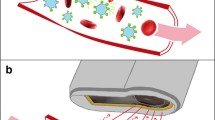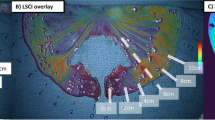Abstract
Background/Aims
Mortality in mesenteric ischaemia can be reduced by an optimised extent of resection. Up to now, no technique supplementing a surgeon's experience has achieved clinical acceptance. Besides a qualitative interpretation, the new technique of computer-assisted laser-fluorescence videography affords quantification of staining intensities. The aim of this study was to investigate the scientific value of this technique in mesenteric ischaemia in a rabbit model of controlled mesenteric ischaemia and reperfusion.
Methods
We used an established rabbit model of mesenteric ischaemia (group I, n=6) and reperfusion (group II, n=6). In each animal, three loops (each of 10 cm) of the small intestine were clamped (group I, 40 min; group II, 60 and 20 min reperfusion). For further evaluation, all loops were divided into five segments of 2×2 cm (total number of investigated areas, n=180). Measurement of vascular patency was performed by laser-fluorescence videography (pixel intensity per second). As standard, we used radioactive microspheres (impulse per minute per gram). In addition, the extent of ischaemic tissue damage was identified by histological examination. Statistical data were analysed by using regression analysis to define the regression coefficient r.
Results/Findings
Laser-fluorescence videography and the microsphere technique demonstrated a close and linear correlation: ischaemic segments, r=0.90±0.07; reperfusion segments, r=0.85±0.02; overall, r=0.92±0.07. There was no reproducible correlation to cellular damage in histology.
Interpretation/Conclusion
Computer-assisted laser-fluorescence videography is a feasible, reliable, and valid experimental method for the detection of mesenteric blood supply and intestinal microcirculation. Clinical application is conceivable in mesenteric ischaemia and infarction as well as the operative transposition of intestine. As limiting values to identify the irreversible necrosis are not yet defined, further studies have to analyse the clinical impact more precisely.








Similar content being viewed by others
References
Schneider TA, Longo WE, Ure T et al (1994) Mesenteric ischemia. Acute arterial syndromes. Dis Colon Rectum 37:1163–1174
Eckstein HH (2003) Acute mesenteric ischemia. Resection or reconstruction. Chirurg 74:419–431
Endean ED, Barnes SL, Kwolek CJ et al (2001) Surgical management of thrombotic acute intestinal ischemia. Ann Surg 233:801–808
Billings PJ, Foster ME, Leaper DJ (1986) A clinical and experimental study of colostomy blood flow and healing after closure. Int J Colorectal Dis 1:108–112
Thompson JS, Bragg LE, West WW (1990) Serum enzyme levels during intestinal ischemia. Ann Surg 211:369–373
Kurland B, Brandt LJ, Delaney HM (1992) Diagnostic tests for intestinal ischemia. Surg Clin North Am 72:85–106
Mizock BA, Falk JL (1993) Lactic acidosis in critical illness. Crit Care Med 20:80–93
Sailer M, Debus ES, Fuchs KH (2000) Comparison of anastomotic microcirculation in coloanal J-pouches versus straight and side-to-end coloanal reconstruction: an experimental study in the pigs. Int J Colorectal Dis 15:114–117
Caglayan F, Caglayan O, Gunel E et al (2002) Intestinal ischemia–reperfusion and plasma enzyme levels. Pediatr Surg Int 18:255–257
Pargger H, Staender S, Studer W et al (1997) Occlusive mesenteric ischemia and its effects on jejunal intramucosal pH, mesenteric oxygen consumption, and oxygen tensions from surface of the jejunum in anesthetized pigs. J Intensive Care Med 23:91–99
Brandt LJ, Boley SJ (2000) AGA technical review on intestinal ischemia. American Gastrointestinal Association. Gastroenterology 118:954–968
Sato A, Kuwabara Y, Sugiura M et al (1999) Intestinal energy metabolism during ischemia and reperfusion. J Surg Res 82:261–267
Lange K, Boyd LJ (1934) The technique of the fluorescein test to determine the adequacy of circulation in peripheral vascular diseases, the circulation time, and capillary permeability. Bull N Y Med Coll Flower 5fth Ave Hosp 6:78–81
McGinty JJ, Hogle N, Fowler DR (2002) Laparoscopic evaluation of intestinal ischemia using fluorescein and ultraviolet light in a porcine model. Surg Endosc 17:1140–1143
Gorey T (1980) The recovery of intestine after ischemic injury. Br J Surg 67:699–702
Pearce W, Jones D, Warren G et al (1987) The use of infrared photoplethysmography in identifying early intestinal ischemia. Arch Surg 122:308–310
Bulkley GB, Zuidema GD, Hamilton SR et al (1981) Intraoperative determination of small intestinal viability following ischemic injury. Ann Surg 193:628–637
Ballard LJ, Stone WM, Hallett JW et al (1993) A critical analysis of adjuvant techniques used to assess bowel viability in acute mesenteric ischemia. Am Surg 59:309–311
Ando M, Ito M, Nihei Z et al (2000) Assessment of intestinal viability using a non-contact laser tissue blood flowmeter. Am J Surg 180:176–180
Bartrum RJ, Berkowitz DM, Hollenberg NK (1974) A simple radioactive microsphere method for measuring regional blood flow and cardiac output. Invest Radiol 9:126–132
Appleyard CB, Willimas JL, Hathaway CA et al (1999) Temporal patterns of colonic blood flow and tissue damages in an animal model of colitis. Dig Dis Sci 44:431–438
Sparrow R, Conolly HM (1988) Blood flow to the rat rectum: its intramural distribution and the response to injury. J Anat 159:73–82
Park PO, Haglund U, Bulkley G et al (1990) The sequence of development of intestinal tissue injury after strangulation ischemia and reperfusion. Surgery 107:574–580
Gervais M, Demolis P, Domergue V et al (1999) Systemic and regional hemodynamics assessment in rats with fluorescent microspheres. J Cardiovasc Pharmacol 33:425–432
Juel IS, Solligard E, Lyng O et al (2004) Intestinal injury after thoracic aortic cross-clamping in the pig. J Surg Res 117:283–295
Eisberg HB (1924) Intestinal arteries. Anat Rec 28:227
Lang J, Heichele J (1982) Vessels of the small bowel. Morphol Med 2:207–216
Hansen HH, Stelzner F (1975) Surgical anatomy of the blood supply of the colon. Langenbecks Arch Chir 340:63–74
Premen AJ, Banchs V, Womack WA et al (1987) Importance of collateral circulation in the vascularly occlude feline intestine. Gastroenterology 92:1215–1219
Grandison AS, Yates J, Shields R (1981) Capillary blood flow in the canine colon and other organs at normal and raised portal pressure. Gut 22:223–227
Tollefson DF, Wright DJ, Reddy DJ et al (1995) Intraoperative determination of intestinal viability by pulse oxymetry. Ann Vasc Surg 9:357–360
MacDonald PH, Dinda PK, Bech IT et al (1993) The use of oxymetry in determining intestinal blood flow. Surg Gynecol Obstet 176:451–458
Cooperman M, Pace WG, Martin EW et al (1978) Determination of viability of ischemic intestine by Doppler ultrasound. Surgery 83:705–710
Author information
Authors and Affiliations
Corresponding author
Additional information
C. Toens and C.J. Krones contributed equally to this work.
Rights and permissions
About this article
Cite this article
Toens, C., Krones, C.J., Blum, U. et al. Validation of IC-VIEW fluorescence videography in a rabbit model of mesenteric ischaemia and reperfusion. Int J Colorectal Dis 21, 332–338 (2006). https://doi.org/10.1007/s00384-005-0017-1
Accepted:
Published:
Issue Date:
DOI: https://doi.org/10.1007/s00384-005-0017-1




